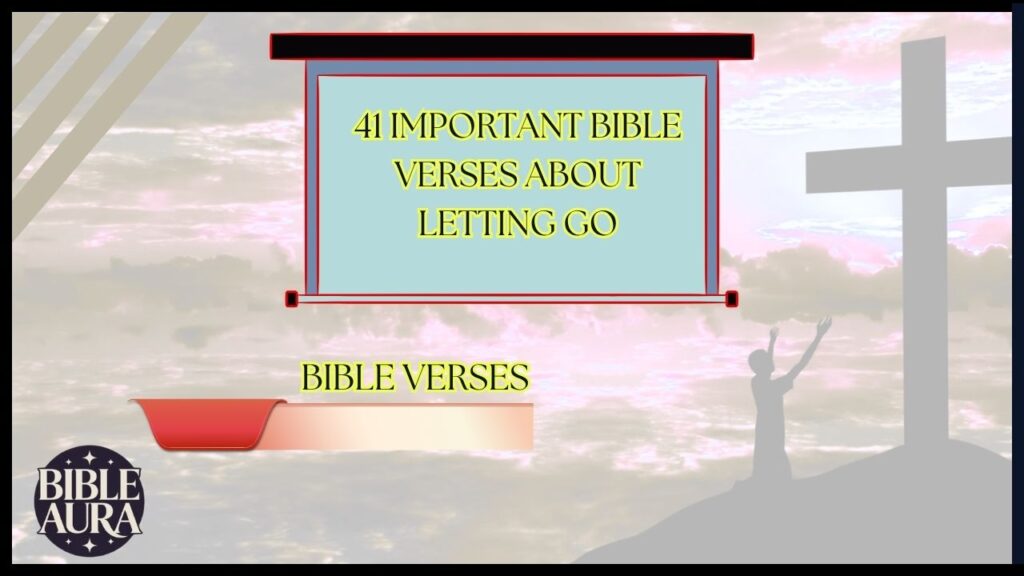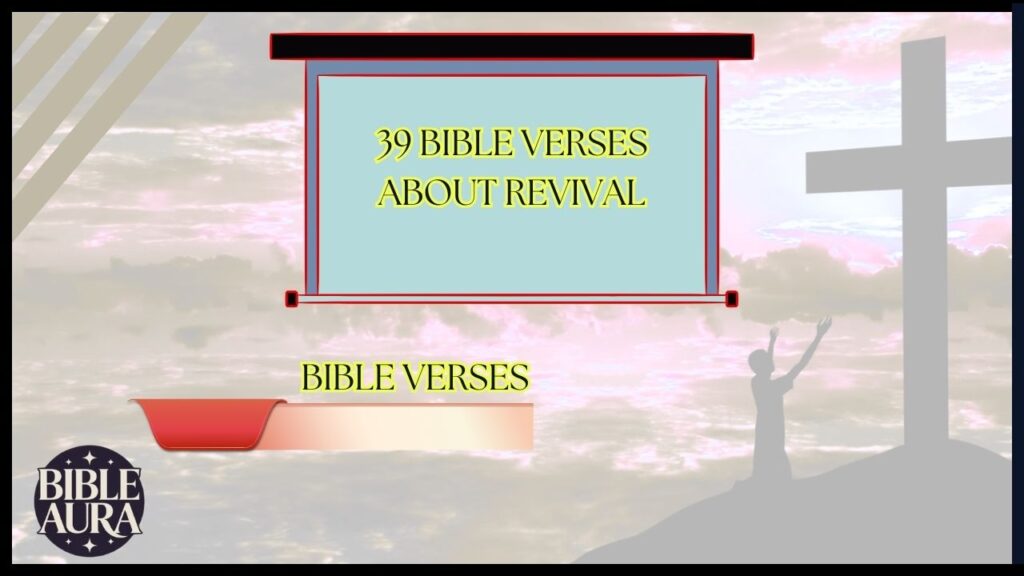Bible Verses About Letting Go: In the journey of faith, few challenges test our spiritual resilience more than learning to let go. Whether it’s releasing past hurts, surrendering control, or forgiving those who have wronged us, the Bible offers profound wisdom on the freedom that comes through release.
Scripture reminds us that holding onto pain, bitterness, and worry only weighs down our spirits and hinders our relationship with God. When we cling to what we should release, we find ourselves trapped in cycles of resentment and fear.
God’s Word provides us with a roadmap for liberation showing us that letting go isn’t simply about abandoning our concerns, but rather entrusting them to the One who can handle them perfectly. Through these verses, we discover that releasing what binds us creates space for God’s peace, healing, and renewal to enter our lives.
Also Read: 36 Important Bible Verses About Karma
Releasing Past Hurts
1. Philippians 3:13-14
“Brothers and sisters, I do not consider myself yet to have taken hold of it. But one thing I do: Forgetting what is behind and straining toward what is ahead, I press on toward the goal to win the prize for which God has called me heavenward in Christ Jesus.”
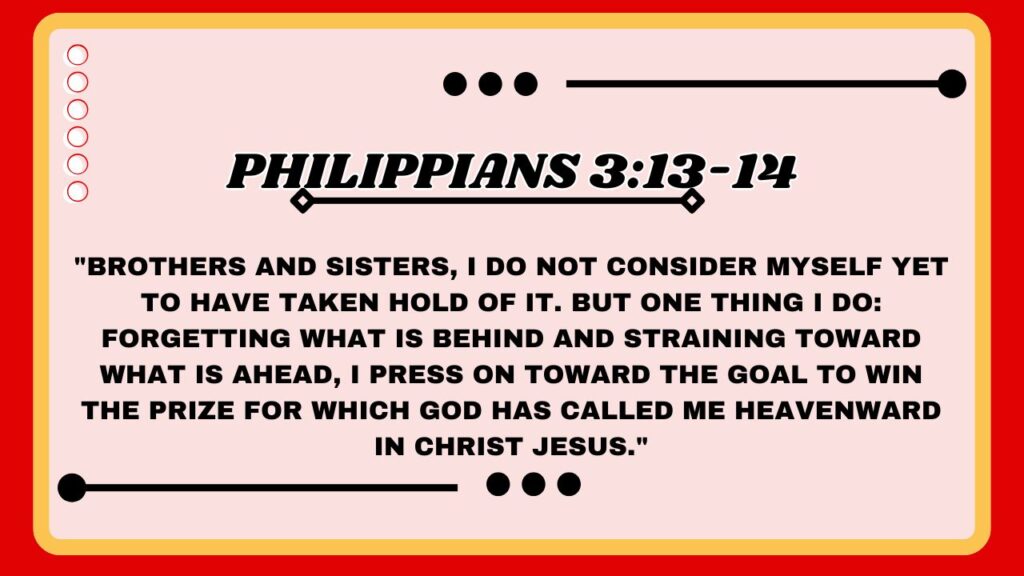
Paul reminds us that spiritual growth requires leaving the past behind. This verse encourages us to release our attachment to past failures and successes, focusing instead on God’s calling for our future. Try setting aside time each day to pray specifically about releasing one past hurt, then visualize yourself moving forward without its weight.
2. Isaiah 43:18-19
“Forget the former things; do not dwell on the past. See, I am doing a new thing! Now it springs up; do you not perceive it? I am making a way in the wilderness and streams in the wasteland.”
God invites us to recognize His redemptive work rather than dwelling on past disappointments. This passage shows that fixating on what’s behind prevents us from seeing the fresh opportunities God is creating. Consider keeping a “new things” journal where you record evidence of God’s renewing work in your life.
3. Job 11:13-16
“Yet if you devote your heart to him and stretch out your hands to him, if you put away the sin that is in your hand and allow no evil to dwell in your tent, then, free of fault, you will lift up your face; you will stand firm and without fear. You will surely forget your trouble, recalling it only as waters gone by.”
These verses promise that devotion to God leads to freedom from past troubles. Job’s story reminds us that even profound suffering can eventually fade from memory when we place our trust in God. When painful memories surface, practice redirecting your thoughts to God’s faithfulness through challenging seasons.
4. Luke 9:62
“Jesus replied, ‘No one who puts a hand to the plow and looks back is fit for service in the kingdom of God.'”
Jesus uses this agricultural metaphor to illustrate the importance of forward focus in discipleship. Looking backward while attempting to move forward creates crooked paths and ineffective service. Make a commitment to catch yourself when you’re dwelling on past events, and consciously choose to refocus on present opportunities to serve.
5. 2 Corinthians 5:17
“Therefore, if anyone is in Christ, the new creation has come: The old has gone, the new is here!”
Paul declares that our identity in Christ makes us entirely new creations. This verse reminds us that when we accept Christ, we’re freed from being defined by our past. Create a list of “old self” characteristics you’re leaving behind and “new self” qualities you’re embracing in Christ.
Also Read: 39 Important Bible Verses About Long Life
Surrendering Control and Worry
6. Matthew 6:25-27
“Therefore I tell you, do not worry about your life, what you will eat or drink; or about your body, what you will wear. Is not life more than food, and the body more than clothes? Look at the birds of the air; they do not sow or reap or store away in barns, and yet your heavenly Father feeds them. Are you not much more valuable than they? Can any one of you by worrying add a single hour to your life?”
Jesus teaches that worry accomplishes nothing while demonstrating a lack of trust in God’s provision. This passage illustrates God’s care for even the smallest creatures, assuring us of His much greater concern for us. Practice “worry replacement” whenever anxious thoughts arise, consciously replace them with statements of God’s faithfulness.
7. Philippians 4:6-7
“Do not be anxious about anything, but in every situation, by prayer and petition, with thanksgiving, present your requests to God. And the peace of God, which transcends all understanding, will guard your hearts and your minds in Christ Jesus.”
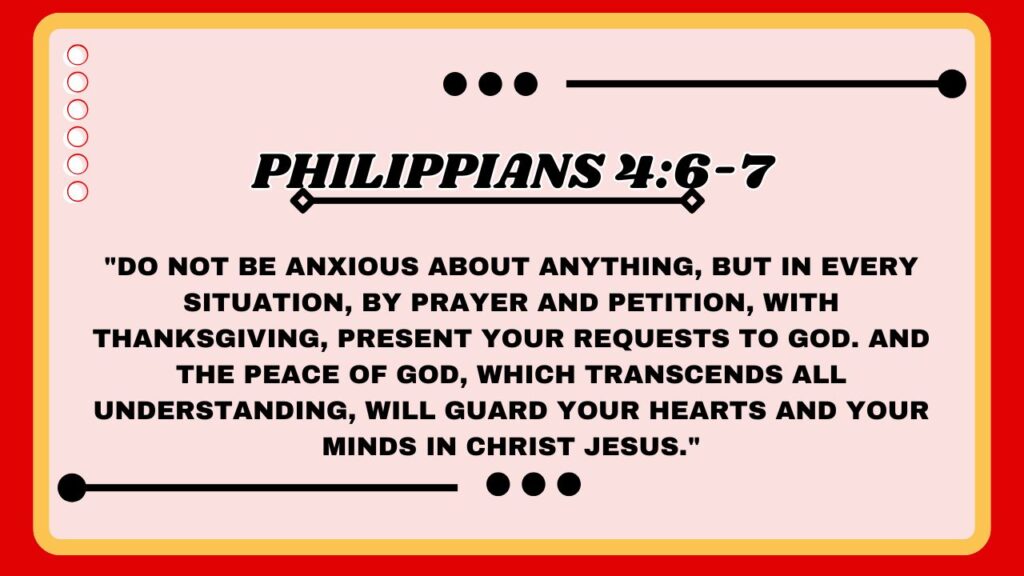
Paul provides a practical alternative to anxiety: bringing our concerns to God with grateful hearts. This verse promises that surrendering our worries through prayer leads to supernatural peace. Develop a daily “surrender practice” where you write down your concerns, pray over them, and symbolically place them in God’s hands.
8. Proverbs 3:5-6
“Trust in the LORD with all your heart and lean not on your own understanding; in all your ways submit to him, and he will make your paths straight.”
Solomon advises complete trust in God rather than reliance on our limited perspective. This wisdom reminds us that our understanding is incomplete, while God sees the full picture of our lives. When facing decisions, practice saying, “God, I release my need to understand everything and trust your guidance.”
9. Psalm 55:22
“Cast your cares on the LORD and he will sustain you; he will never let the righteous be shaken.”
David encourages transferring our burdens to God through prayer and trust. This verse promises divine support when we release our worries to Him. Create a physical reminder of this practice perhaps a small stone you can hold while mentally “casting” your concerns to God.
10. 1 Peter 5:7
“Cast all your anxiety on him because he cares for you.”
Peter echoes the Psalms in urging believers to release anxieties to God. This verse reminds us that God’s love motivates His desire to carry our burdens. Before bed each night, mentally “hand over” any worries to God, acknowledging His care for you.
11. Matthew 11:28-30
“Come to me, all you who are weary and burdened, and I will give you rest. Take my yoke upon you and learn from me, for I am gentle and humble in heart, and you will find rest for your souls. For my yoke is easy and my burden is light.”
Jesus invites the exhausted to exchange their heavy burdens for His lighter load. This beautiful invitation reminds us that holding onto our struggles leads to weariness, while Christ offers true rest. Visualize yourself laying down specific burdens at Jesus’ feet and receiving His lighter yoke of grace.
12. Psalm 37:7
“Be still before the LORD and wait patiently for him; do not fret when people succeed in their ways, when they carry out their wicked schemes.”
David counsels quiet trust in God’s timing rather than agitation over others’ apparent success. This verse teaches that peaceful waiting honors God more than anxious striving. Practice regular “stillness intervals” brief moments throughout your day to cease activity, breathe deeply, and center yourself in God’s presence.
13. Isaiah 26:3
“You will keep in perfect peace those whose minds are steadfast, because they trust in you.”
Isaiah reveals the connection between trust in God and experiencing supernatural peace. This verse promises that focusing our minds on God rather than our circumstances leads to inner calm. Create a list of God’s attributes to meditate on when your mind begins racing with worries.
Forgiving Others
14. Matthew 6:14-15
“For if you forgive other people when they sin against you, your heavenly Father will also forgive you. But if you do not forgive others their sins, your Father will not forgive your sins.”
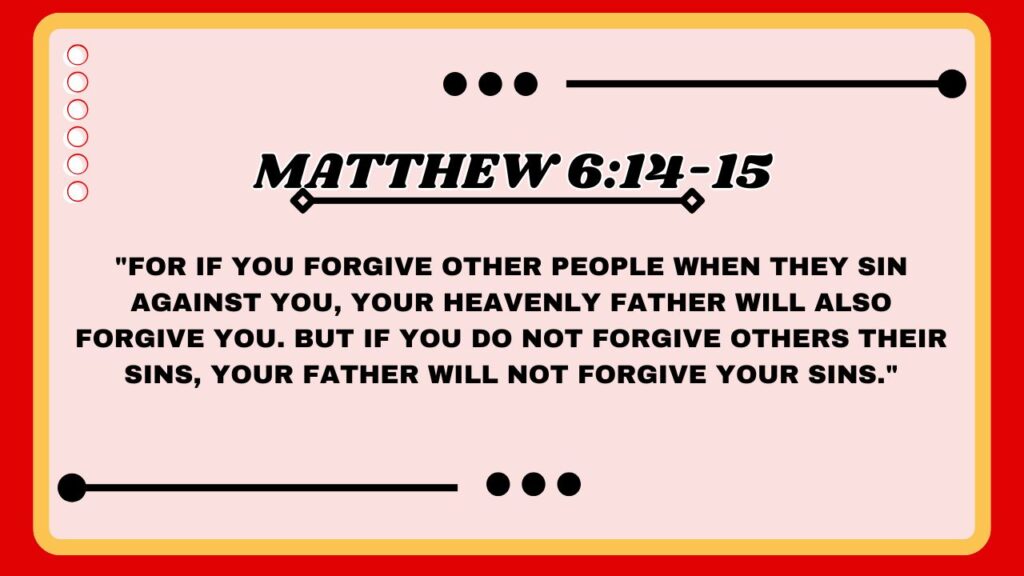
Jesus establishes a direct connection between receiving forgiveness and extending it to others. This verse reveals that holding onto unforgiveness blocks our ability to experience God’s forgiveness. Write a letter to someone who has hurt you (that you don’t need to send) expressing your choice to forgive them.
15. Ephesians 4:31-32
“Get rid of all bitterness, rage and anger, brawling and slander, along with every form of malice. Be kind and compassionate to one another, forgiving each other, just as in Christ God forgave you.”
Paul contrasts the destructive emotions of unforgiveness with the Christ-like qualities of kindness and compassion. This passage reminds us that our forgiveness should mirror God’s generous forgiveness toward us. Identify any “bitter roots” in your heart and commit to uprooting them through prayer and choosing compassion.
16. Colossians 3:13
“Bear with each other and forgive one another if any of you has a grievance against someone. Forgive as the Lord forgave you.”
Paul instructs believers to patiently endure others’ faults and release grievances. This verse establishes Christ’s forgiveness as our standard complete, gracious, and undeserved. When tempted to hold a grudge, ask yourself: “How has Christ forgiven me for similar or worse offenses?”
17. Luke 6:37
“Do not judge, and you will not be judged. Do not condemn, and you will not be condemned. Forgive, and you will be forgiven.”
Jesus teaches that our treatment of others establishes the pattern for how we ourselves will be treated. This verse shows forgiveness as part of a larger principle of giving what we hope to receive. Practice offering a silent blessing to those who have hurt you when memories of their offense surface.
18. Mark 11:25
“And when you stand praying, if you hold anything against anyone, forgive them, so that your Father in heaven may forgive you your sins.”
Jesus instructs us to address unforgiveness even during our prayer time. This verse reveals that harboring resentment interferes with our communion with God. Before praying, take a moment to ask God if there’s anyone you need to forgive, then release them before continuing your prayer.
19. Romans 12:19
“Do not take revenge, my dear friends, but leave room for God’s wrath, for it is written: ‘It is mine to avenge; I will repay,’ says the Lord.”
Paul cautions against personal vengeance, instructing believers to entrust justice to God. This verse reminds us that seeking revenge usurps God’s role as the perfect judge. When wronged, practice saying, “I release my right to get even and trust God with this situation.”
20. Luke 23:34
“Jesus said, ‘Father, forgive them, for they do not know what they are doing.’ And they divided up his clothes by casting lots.”
Even while suffering crucifixion, Jesus modeled forgiveness toward His executioners. This powerful example shows that forgiveness is possible even in the face of extreme injustice. When forgiveness seems impossible, meditate on this scene of Christ on the cross, extending mercy to those who were killing Him.
Also Read: 47 Bible Verses About Being Set Apart (Explained)
Releasing Guilt and Shame
21. Romans 8:1-2
“Therefore, there is now no condemnation for those who are in Christ Jesus, because through Christ Jesus the law of the Spirit who gives life has set you free from the law of sin and death.”
Paul declares believers completely free from condemnation through Christ. This verse assures us that our position in Christ permanently removes the burden of guilt. When feelings of condemnation arise, respond by declaring, “In Christ, I am free from condemnation” and rest in that truth.
22. Psalm 103:12
“As far as the east is from the west, so far has he removed our transgressions from us.”
David uses a powerful spatial metaphor to illustrate the completeness of God’s forgiveness. This verse pictures our sins as infinitely removed from us, never to be brought back. Visualize your confessed sins being carried from east to west an immeasurable distance that represents God’s complete forgiveness.
23. Isaiah 43:25
“I, even I, am he who blots out your transgressions, for my own sake, and remembers your sins no more.”
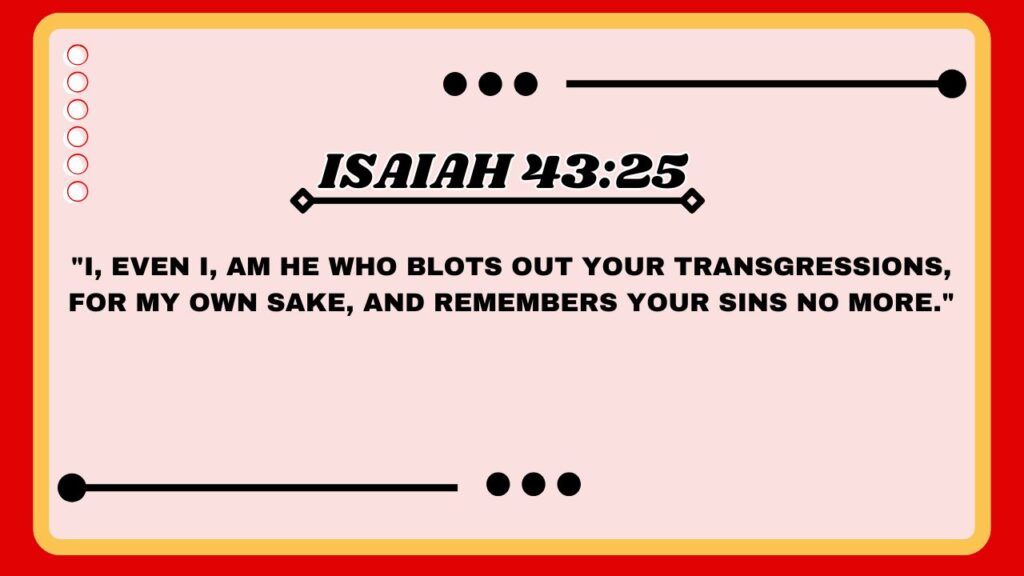
God declares His complete erasure of our sins from His memory. This verse shows God actively choosing to forget what He has forgiven. When past failures haunt you, remind yourself that if God has chosen to forget them, you have permission to do the same.
24. Micah 7:19
“You will again have compassion on us; you will tread our sins underfoot and hurl all our iniquities into the depths of the sea.”
Micah portrays God disposing of our sins in the ocean depths, never to be retrieved. This vivid imagery illustrates the permanence and completeness of divine forgiveness. Consider performing a symbolic act, like dropping a stone into water, to represent releasing guilt over a specific sin.
25. 1 John 1:9
“If we confess our sins, he is faithful and just and will forgive us our sins and purify us from all unrighteousness.”
John provides the simple pathway to forgiveness: honest confession. This verse assures us that God’s character guarantees both forgiveness and cleansing when we admit our wrongs. Develop a regular practice of specific confession, followed by thanking God for His complete cleansing.
26. Isaiah 1:18
“‘Come now, let us settle the matter,’ says the LORD. ‘Though your sins are like scarlet, they shall be as white as snow; though they are red as crimson, they shall be like wool.'”
God invites honest dialogue that results in complete transformation of our spiritual condition. This verse uses the contrast between vibrant red and pure white to illustrate the radical nature of divine forgiveness. When guilt persists, visualize God washing your scarlet sins white as snow through Christ’s sacrifice.
27. 2 Corinthians 7:10
“Godly sorrow brings repentance that leads to salvation and leaves no regret, but worldly sorrow brings death.”
Paul distinguishes between productive godly grief and destructive worldly shame. This verse shows that proper sorrow leads to positive change rather than endless regret. When feeling shame, ask yourself: “Is this leading me toward God or away from Him?” Choose to transform regret into motivation for growth.
Also Read: 45 Bible Verses About Gossip and Slander (Explained)
Trusting God’s Plan and Timing
28. Jeremiah 29:11
“For I know the plans I have for you,” declares the LORD, “plans to prosper you and not to harm you, plans to give you hope and a future.”
God assures His people of His benevolent intentions for their lives. This beloved verse reminds us that releasing our own agendas allows us to embrace God’s superior plan. Write this verse on a card and review it whenever you feel anxious about surrendering your plans to God.
29. Proverbs 16:9
“In their hearts humans plan their course, but the LORD establishes their steps.”
Solomon acknowledges our planning while affirming God’s ultimate direction. This verse balances human responsibility with divine sovereignty in shaping our path. Hold your plans loosely, regularly praying, “Lord, establish my steps according to Your will, not mine.”
30. Romans 8:28
“And we know that in all things God works for the good of those who love him, who have been called according to his purpose.”
Paul declares God’s ability to weave all circumstances even painful ones into a pattern of good. This verse provides confidence that releasing control doesn’t mean abandoning hope for positive outcomes. When facing disappointments, practice saying, “I may not see the good yet, but I trust You are working all things together for good.”
31. Ecclesiastes 3:1
“There is a time for everything, and a season for every activity under the heavens.”
Solomon observes the rhythmic nature of life with its various seasons. This wisdom reminds us that what seems permanent is often temporary, helping us hold circumstances loosely. Create a simple “seasons chart” noting different phases you’ve experienced, recognizing that difficult seasons eventually give way to new ones.
32. Isaiah 55:8-9
“‘For my thoughts are not your thoughts, neither are your ways my ways,’ declares the LORD. ‘As the heavens are higher than the earth, so are my ways higher than your ways and my thoughts than your thoughts.'”

God reveals the vast difference between divine and human perspective. This passage reminds us that our limited understanding should lead to humble trust rather than frustrated control. When God’s ways seem incomprehensible, practice saying, “I release my need to understand and trust Your higher wisdom.”
33. Psalm 31:15
“My times are in your hands; deliver me from the hands of my enemies, from those who pursue me.”
David acknowledges God’s authority over the timing and circumstances of his life. This verse models entrusting our past, present, and future to God’s capable hands. During times of uncertainty, open your hands palms-up as a physical gesture of releasing control to God.
34. Habakkuk 2:3
“For the revelation awaits an appointed time; it speaks of the end and will not prove false. Though it linger, wait for it; it will certainly come and will not delay.”
God encourages patience when His promises seem delayed. This verse assures us that divine timing is perfect never truly late, even when it feels that way to us. When waiting becomes difficult, remind yourself that God’s delays are not denials, but often preparation for something better.
Also Read: 42 Powerful Bible Verses For Baby Dedication
Embracing God’s Healing and Freedom
35. John 8:36
“So if the Son sets you free, you will be free indeed.”
Jesus declares the comprehensive nature of the freedom He provides. This verse reminds us that true liberation comes through Christ, not through our own efforts at release. Identify areas where you’re trying to free yourself through willpower alone, and instead invite Christ to bring His genuine freedom.
36. Galatians 5:1
“It is for freedom that Christ has set us free. Stand firm, then, and do not let yourselves be burdened again by a yoke of slavery.”
Paul reminds believers of the purpose of Christ’s liberating work our complete freedom. This verse warns against returning to old bondages after experiencing release. Create a personal “freedom declaration” identifying specific bondages Christ has broken in your life.
37. 2 Corinthians 3:17
“Now the Lord is the Spirit, and where the Spirit of the Lord is, there is freedom.”
Paul connects the presence of God’s Spirit with the experience of freedom. This verse suggests that inviting God’s Spirit into our situations brings liberation. Practice “breath prayers” throughout your day, breathing in with “Spirit of God” and out with “bring Your freedom.”
38. Isaiah 61:1
“The Spirit of the Sovereign LORD is on me, because the LORD has anointed me to proclaim good news to the poor. He has sent me to bind up the brokenhearted, to proclaim freedom for the captives and release from darkness for the prisoners.”
This prophetic verse, later claimed by Jesus, announces liberation as central to God’s redemptive mission. It reveals God’s special concern for those experiencing various forms of bondage. Identify any “prison” you may be in whether emotional, spiritual, or relational and invite Christ the Liberator to release you.
39. Psalm 107:14
“He brought them out of darkness, the utter darkness, and broke away their chains.”
The psalmist celebrates God’s deliverance of those in bondage. This verse portrays God actively intervening to free people from their darkest circumstances. When feeling trapped, visualize God breaking the specific chains that bind you and leading you into light.
40. James 5:16
“Therefore confess your sins to each other and pray for each other so that you may be healed. The prayer of a righteous person is powerful and effective.”
James connects confession, prayer, and healing in community. This verse reveals that sometimes letting go requires the vulnerability of sharing our struggles with trusted believers. Identify a mature Christian friend with whom you can share your struggle to let go, and ask for their prayers.
41. John 10:10
“The thief comes only to steal and kill and destroy; I have come that they may have life, and have it to the full.”

Jesus contrasts the enemy’s destructive intentions with His own purpose of abundant life. This verse reminds us that holding onto hurts, control, unforgiveness, and guilt serves the enemy’s purposes, not Christ’s. Ask yourself regularly: “Is what I’m holding onto leading to death or life?” Choose to release anything that prevents the full life Jesus offers.
Also Read: 38 Bible Verses About Welcoming Visitors (Explained)
Conclusion: Bible Verses About Letting Go
The journey of letting go is perhaps one of the most challenging yet transformative aspects of the Christian walk. These 41 verses reveal a profound truth: what we release doesn’t simply disappear it’s transferred into the capable hands of God.
Scripture consistently shows that letting go isn’t a passive act of resignation but rather an active choice to trust God’s character and promises. When we release past hurts, we make room for healing; when we surrender control, we experience peace; when we forgive others, we ourselves are freed; when we release guilt, we embrace grace; and when we trust God’s timing, we discover His perfect plan.
As you meditate on these verses, remember that letting go is a continuous process rather than a one-time event. Each day presents new opportunities to release what weighs you down and embrace the freedom Christ died to give you.
Bonus: Practical Ways to Use These Verses in Your Journey of Letting Go
- Create a Letting Go Journal: Write down what you need to release, paired with a corresponding verse that speaks to your specific situation.
- Memory Verse Cards: Write key verses on small cards to carry with you, pulling them out when you feel tempted to hold onto what you should release.
- Prayer Walks: Take regular walks while meditating on a specific verse about letting go, allowing physical movement to reinforce your spiritual journey.
- Scripture Meditation: Spend 5-10 minutes daily dwelling on one verse, allowing its truth to penetrate areas where you struggle to let go.
- Visual Reminders: Create simple symbols (like an open hand) to place around your home as reminders of your commitment to release and trust God.
- Accountability Partnership: Share your letting go journey with a trusted friend who can pray with you and remind you of these scriptural truths.
- Release Rituals: Develop meaningful practices that symbolize release, such as writing down burdens and then destroying the paper.
- Verse-Based Prayers: Transform these scriptures into personalized prayers expressing your desire to let go and trust God.
Frequently Asked Questions
Why is letting go so difficult from a biblical perspective?
Letting go challenges our human desire for control and justice. Scripture acknowledges this struggle throughout from Moses’s reluctance to lead to Peter’s resistance to Jesus’s path to the cross. The Bible shows that our fallen nature tends to cling to what feels safe rather than stepping into the uncertainty of trust. Additionally, our enemy actively opposes our freedom, as John 10:10 reveals. Yet God’s Word consistently reminds us that His grace empowers us to release what we cannot control.
Does letting go mean I’m giving up or showing weakness?
Biblical letting go is actually an act of strength, not weakness. It requires tremendous courage to release our grip on what we’ve been holding tightly. Jesus demonstrated this in Gethsemane when He prayed, “Not my will, but yours be done” (Luke 22:42). This surrender led not to defeat but to the greatest victory in history. When we release our burdens to God, we’re not abandoning responsibility but rather acknowledging that some matters are beyond our control and best entrusted to divine wisdom.
How can I forgive someone who hasn’t apologized or changed?
Christ-like forgiveness isn’t dependent on the other person’s response. Jesus forgave His executioners while they were still in the act of crucifying Him (Luke 23:34). Forgiveness is a decision to release the debt another owes you, freeing yourself from the prison of bitterness. It doesn’t require reconciliation (which takes two willing parties) or forgetting what happened. Instead, it means choosing not to let another’s actions control your emotional and spiritual health. This kind of forgiveness becomes possible when we reflect on God’s extravagant forgiveness toward us.
How do I know when to persevere and when to let go?
This requires spiritual discernment. Scripture encourages both perseverance (James 1:12) and release (Philippians 3:13-14) in different contexts. Generally, we should persevere through challenges that align with God’s revealed will and purposes, while releasing situations involving others’ free will, past regrets we cannot change, or circumstances beyond our control. Prayerfully ask: “Am I trying to control what only God can control? Is holding on causing harm to myself or others? Is my attachment to this hindering my spiritual growth?” The Holy Spirit provides wisdom when we honestly seek guidance.
If I’ve tried to let go but keep struggling with the same issues, have I failed?
Letting go is rarely a one-time event it’s a process that often requires repeated surrender. Even Paul, who wrote about “forgetting what is behind” (Philippians 3:13), likely had to recommit to this mindset regularly. When old hurts, worries, or guilt resurface, it doesn’t mean you’ve failed; it means you’re human. Each time you choose again to release these burdens to God, your “letting go muscle” strengthens. God’s grace covers our imperfect attempts, and His mercies are “new every morning” (Lamentations 3:22-23), providing fresh opportunities to release what we keep retrieving.
Read more knowledgeable blogs on Bible Aura

Piper McMillan is a passionate writer and educator dedicated to sharing the beauty and depth of the Bible. As the author behind the Piper McMillan website, she explores Bible verses, unlocks biblical narratives, and provides insights for living a Christ-centered life. Through warm, approachable, and inspiring articles, Piper guides readers to deepen their understanding of Scripture and apply its timeless wisdom to daily living. Her mission is to uplift, educate, and help others walk faithfully with God, rooted in His word.

